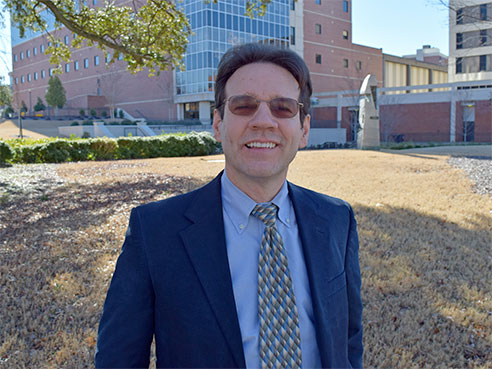 Robert Weech-Maldonado, Ph.D.Researchers from the University of Alabama at BirminghamSchool of Health Professions have been awarded $1.25 million by the Agency for Healthcare Research and Quality to better understand the management and market factors associated with high performance among nursing homes that have a high proportion, 85 percent or greater, of Medicaid residents.
Robert Weech-Maldonado, Ph.D.Researchers from the University of Alabama at BirminghamSchool of Health Professions have been awarded $1.25 million by the Agency for Healthcare Research and Quality to better understand the management and market factors associated with high performance among nursing homes that have a high proportion, 85 percent or greater, of Medicaid residents.
Robert Weech-Maldonado, Ph.D., professor and L.R. Jordan Chair of the Department of Health Services Administration, says this five-year R01 grant is for a mixed-methods analysis — using both quantitative and qualitative studies — to study high-Medicaid-resident nursing homes and identify evidence-based, best management practices.
“Nobody has taken a mixed-methods look at why some high-Medicaid nursing homes perform well and others do not,” Weech-Maldonado said. “This grant will enable us to gather quantitative data, such as surveys of management, and find patterns. Following that, we will use qualitative methods, such as interviewing staff, to reveal the complete story about what is really happening inside nursing homes across the United States.”
The five-year project, titled “Performance of High-Medicaid Nursing Homes – Contextual and Management Factors,” will survey management from 1,000-1,200 nursing homes to learn which management practices are in use. After analysis, Weech-Maldonado’s team will select eight nursing homes — four of the best-performing and four of the worst-performing — for qualitative analysis. They will work directly with the staff of each nursing home to study its finances and quality of care.
| “High-Medicaid nursing homes have resource constraints, lower-quality care, a higher proportion of minorities and a tendency to be for-profit organizations. Within this vulnerable group of nursing homes, there are performance variations, with some facilities having both better quality and better financial performance than others. We want to learn what management practices and market factors explain these differences in performance.” |
“High-Medicaid nursing homes have resource constraints, lower-quality care, a higher proportion of minorities and a tendency to be for-profit organizations,” Weech-Maldonado said. “Within this vulnerable group of nursing homes, there are performance variations, with some facilities having both better quality and better financial performance than others. We want to learn what management practices and market factors explain these differences in performance.”
A portion of the grant will enable a partnership with the Alabama Quality Assurance Foundation to translate and implement the lessons learned. With the help of AQAF, a collaborative group will be formed to design a new program for the operation of high-Medicaid nursing homes. The team will then select 10 nursing homes across the country for implementation.
“There always is criticism that research is published but not implemented. So we will engage closely with providers to make sure it is implemented in the real world when we are finished,”Weech-Maldonado said.
This is the first mixed-methods R01 grant for the Department of Health Services Administration. The study will include fellow UAB faculty Larry Hearld, Ph.D., Nataliya Ivankova, Ph.D., Amy Landry, Ph.D., Midge Ray, Ph.D., Jeff Szychowski, Ph.D., and Jessica Williams, Ph.D.; plus Rohit Pradhan, Ph.D., University of Arkansas for Medical Sciences; Jane Banaszak-Holl, Ph.D., University of Michigan School of Public Health; and Kent Rondeau, Ph.D., University of Alberta, Canada.

